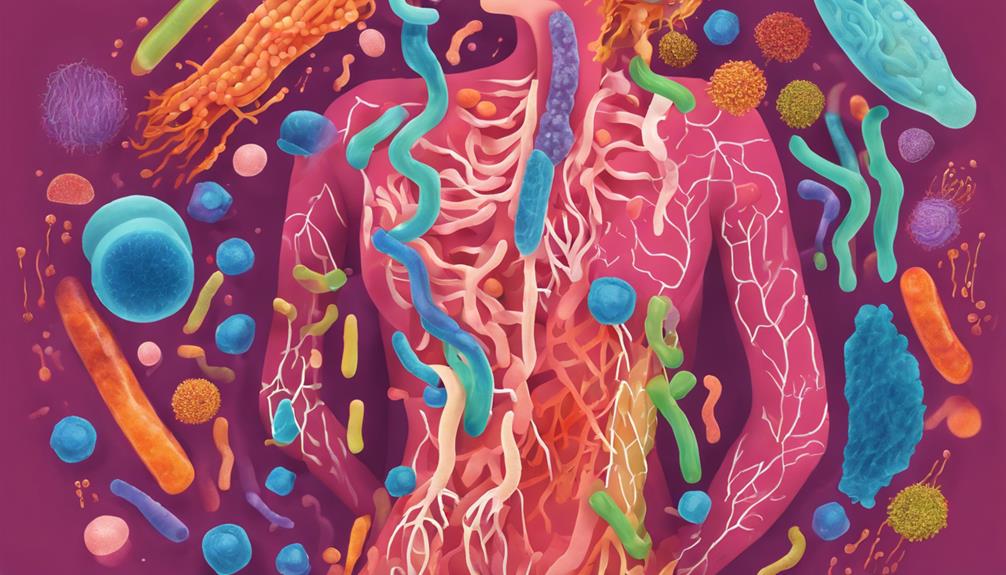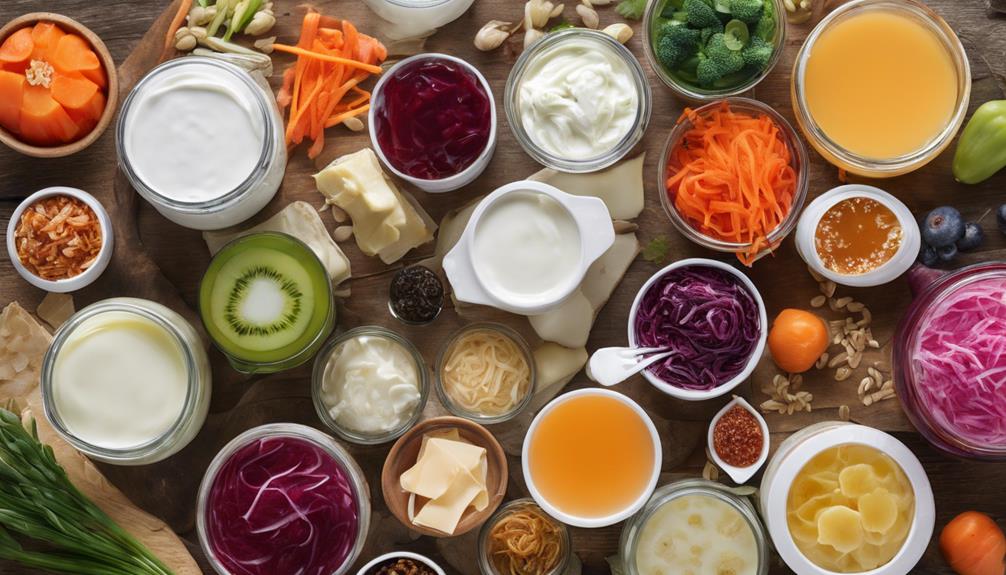How Probiotics Improve Women’s Gut Health
When it comes to improving women's gut health, the impact of probiotics cannot be overstated. These beneficial bacteria hold the key to a well-balanced microbiome, offering a myriad of benefits that go beyond just digestion. From enhancing your immune system to supporting hormonal balance, probiotics play a vital role in maintaining your overall well-being. But how exactly do these tiny organisms achieve such significant results within your gut? Let's explore the fascinating world of probiotics and their transformative effects on women's health.
Importance of Gut Microbiota
The gut microbiota, consisting of trillions of microorganisms residing in your gastrointestinal tract, plays a crucial role in maintaining your overall health. This intricate ecosystem not only aids in digestion but also influences your immune system, mental health, and even your weight.
The gut-brain connection, a bidirectional communication pathway between your gut and brain, highlights how closely linked gut health is to your overall well-being. Research has shown that disturbances in the gut microbiota can impact mood, cognition, and stress responses, emphasizing the importance of maintaining a healthy balance of gut bacteria.
Furthermore, the composition of your gut microbiota has been linked to weight regulation. Imbalances in certain bacteria may contribute to weight gain or difficulty in losing weight.
Role of Probiotics in Gut Health
To optimize your gut health, incorporating probiotics into your daily routine can play a significant role in promoting a balanced and diverse gut microbiota.
Gut flora, which consists of trillions of microorganisms residing in your digestive tract, are essential for maintaining digestive health. Probiotics are live bacteria and yeasts that are beneficial for your gut flora, aiding in digestion and supporting the immune system.
Probiotics work by replenishing and maintaining a healthy balance of good bacteria in your gut. They can help restore gut flora that may have been disrupted due to factors like antibiotic use, stress, or poor diet.
By promoting the growth of beneficial bacteria, probiotics contribute to better digestion and nutrient absorption, leading to improved overall digestive health.
Incorporating probiotic-rich foods like yogurt, kefir, sauerkraut, and kimchi into your diet, or taking probiotic supplements, can help support the diversity and abundance of your gut microbiota. This can result in enhanced gut health, better digestion, and overall well-being.
Benefits for Women's Digestion
For optimal digestive health, women can benefit greatly from incorporating probiotics into their daily regimen. Probiotics are beneficial bacteria that help maintain a healthy balance of gut flora, supporting digestion and overall well-being.
Women, in particular, may experience digestive issues such as bloating, gas, and irregularity due to factors like hormonal fluctuations, stress, and diet. By introducing probiotics into their routine, women can promote the growth of beneficial bacteria in the gut, which can aid in breaking down food, absorbing nutrients, and supporting immune function.
Research has shown that probiotics can help alleviate symptoms of irritable bowel syndrome (IBS), inflammatory bowel disease (IBD), and other gastrointestinal disorders commonly experienced by women. By improving the balance of gut flora, probiotics can enhance digestive health, reduce inflammation, and strengthen the intestinal barrier.
Incorporating probiotic-rich foods like yogurt, kefir, sauerkraut, and kombucha, or taking probiotic supplements, can help women maintain a healthy gut microbiome and support optimal digestive function.
Impact on Hormonal Balance
Improving your gut health through probiotics not only enhances your digestion but also plays a significant role in regulating your hormonal balance. Hormonal regulation is crucial for various aspects of women's health, including menstrual health. Studies suggest that probiotics can help support hormonal balance by influencing the gut-brain axis, affecting the production and metabolism of hormones.
Probiotics have been shown to impact the levels of certain hormones like estrogen and progesterone, which are essential for menstrual cycle regulation. By promoting a healthy balance of these hormones, probiotics may help alleviate symptoms of hormonal imbalances, such as irregular periods, PMS, and menopausal symptoms.
Furthermore, the gut microbiome has the ability to metabolize hormones, affecting their circulation and activity in the body. By maintaining a healthy gut flora through probiotic supplementation, you may support optimal hormonal balance, leading to improved menstrual health and overall well-being.
Strengthening the Immune System
Enhancing your gut health with probiotics can have a profound impact on strengthening your immune system. Probiotics play a crucial role in boosting immunity and providing immune support, which is essential for overall well-being. Here are four ways probiotics can help fortify your immune system:
- Enhancing Gut Barrier Function: Probiotics help maintain the integrity of the gut lining, preventing harmful substances from entering the bloodstream and triggering an immune response.
- Regulating Immune Response: By modulating immune cells in the gut, probiotics can help regulate the body's immune response, promoting a balanced and efficient defense system.
- Reducing Inflammation: Probiotics have been shown to reduce inflammation in the gut, which can contribute to a healthier immune function and overall well-being.
- Supporting Antibody Production: Probiotics can stimulate the production of antibodies, which play a key role in fighting off harmful pathogens and strengthening the immune system.
Alleviating Gut-Related Conditions
Strengthening your gut health through probiotics not only boosts your immune system but can also play a significant role in alleviating gut-related conditions.
The gut-brain connection is a fascinating aspect of how probiotics can impact mental health. Research suggests that the balance of good bacteria in your gut may influence mood, stress levels, and even symptoms of anxiety and depression. By promoting a healthy gut flora, probiotics can potentially help in managing these conditions.
Furthermore, probiotics also offer benefits for skin health. Skin conditions like acne, eczema, and rosacea have been linked to imbalances in gut bacteria. By restoring this balance through probiotic supplementation, it's possible to improve skin health and alleviate these conditions.
The connection between your gut and skin is a clear example of how probiotics can have a holistic impact on your well-being.
Probiotic Strains for Women
When it comes to supporting women's gut health, the selection of appropriate probiotic strains plays a crucial role. Certain probiotic strains have been shown to specifically benefit women by promoting a healthy balance of gut flora and improving digestive health.
Here are four key probiotic strains that can positively impact women's gut health:
- Lactobacillus: This probiotic strain is known for its ability to support overall gut health and aid in the digestion of lactose.
- Bifidobacterium: Bifidobacterium strains are beneficial for promoting a healthy balance of gut bacteria, which is essential for optimal digestive function.
- Lactobacillus rhamnosus: Particularly beneficial for women, this strain may help maintain vaginal health and support a healthy gut flora balance.
- Saccharomyces boulardii: While not a bacteria, this probiotic yeast strain can help improve gut health by combating harmful bacteria and promoting a healthy gut lining.
Including these probiotic strains in your daily routine can help enhance gut health and support overall well-being.
Incorporating Probiotics Into Diet
To effectively incorporate probiotics into your diet, focus on including a variety of probiotic-rich foods and supplements that contain the beneficial strains mentioned earlier. Meal planning plays a crucial role in ensuring you consistently consume probiotics. Here is a helpful table showcasing some probiotic-rich foods and recommended probiotic supplements:
| Probiotic-Rich Foods | Recommended Probiotic Supplements |
|---|---|
| Yogurt | Lactobacillus acidophilus |
| Kefir | Bifidobacterium lactis |
| Sauerkraut | Saccharomyces boulardii |
| Kimchi | Lactobacillus rhamnosus |
Incorporating these foods into your daily meals and considering probiotic supplements can significantly boost your gut health. Remember to consult with a healthcare provider before starting any new supplements, especially if you have underlying health conditions. By being mindful of your diet and adding these probiotic sources, you can promote a balanced gut microbiome and enhance your overall well-being.
Frequently Asked Questions
Can Probiotics Help With Menstrual Cramps and Bloating?
Yes, probiotics can help with menstrual discomfort by reducing inflammation and supporting gut health, leading to potential bloating relief. Incorporating probiotics into your routine may ease these symptoms and improve overall well-being.
Are Probiotics Safe to Take During Pregnancy and Breastfeeding?
During pregnancy and breastfeeding, probiotics are generally safe for most women. They can help maintain a healthy balance of gut microbiota, supporting digestion and immune function. Consider consulting your healthcare provider for personalized advice due to hormonal changes.
Do Probiotics Have Any Impact on Skin Health for Women?
Probiotics play a crucial role in balancing your skin microbiome, enhancing skin health. They strengthen the gut-skin connection, promoting a radiant complexion. Incorporating probiotics into your routine may help support your skin's natural defenses and overall well-being.
Can Probiotics Help With Urinary Tract Infections in Women?
You may be surprised to learn that probiotics can assist in maintaining a healthy gut microbiome, promoting digestive health. Specifically for women, probiotics have shown potential in reducing the occurrence of urinary tract infections.
Are There Specific Probiotic Supplements Recommended for Menopausal Women?
For menopausal women, specific probiotic supplements targeting the gut microbiome can aid in maintaining hormonal balance. These supplements can support digestive health, alleviate symptoms like bloating, and promote overall well-being during this transitional phase of life.
Conclusion
Now that you understand the powerful impact of probiotics on women's gut health, imagine your gut as a vibrant garden flourishing with beneficial bacteria, supporting your digestion, hormonal balance, and immune system. By incorporating probiotics into your daily routine, you can cultivate a diverse and resilient microbiome, paving the way for improved overall well-being and vitality. So, why not nurture your gut garden with the nourishment it deserves? The benefits await you.













